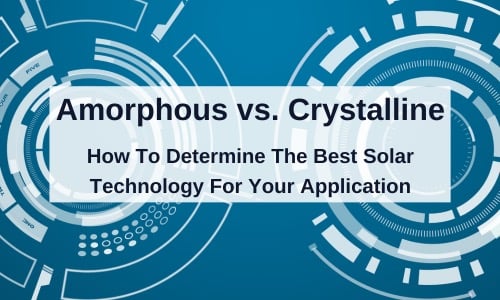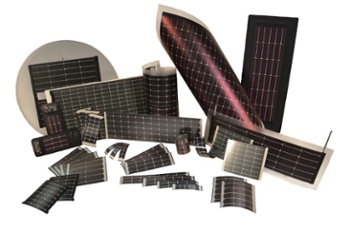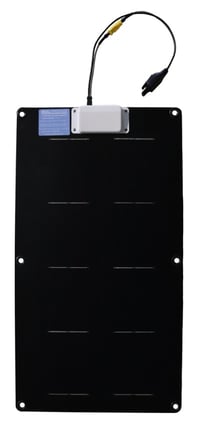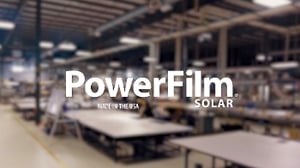Amorphous vs. Crystalline: How To Determine The Best Solar Technology For Your Application

Originally Published 1-25-2019
In the age of portable electronics, companies need unique ways to power products that enhance value, lead to a great customer experience and make business sense.
Often grid power is unavailable, and products have to stand alone and perform day after day.
Solar is almost always at the top of the list when researching renewable solutions to these power problems.
Take this blog post with you!
A simple Google search can lead to thousands of ultra-cheap off-the-shelf solutions, but these solutions rarely meet a business's specific needs.
PowerFilm doesn’t push a small selection of products or even a single technology.
We offer a wide range of amorphous silicon and crystalline silicon solar solutions.
Custom solutions are our focus, and we create the best solutions by selecting the ideal charge controller, encapsulation and substrate for your use case and operating environment.
We listen to your requirements and suggest the best solution (learn more about our custom solar design process).
Before recommending the solar technology that is the best for your needs, let’s examine the advantages of amorphous and crystalline:
Amorphous Advantages:
Durability
- Amorphous silicon material inherently has more tolerance for defects than crystalline. Just how durable is amorphous silicon thin-film solar material? Watch this extreme durability test where we punctured one of our panels. If you damage a portion of the panel, it doesn’t significantly affect the overall power output. In contrast, crystalline panels are far more brittle, and the entire panel will fail if handled roughly.
Portability
- Depending on the design, panels can be easily rolled or folded for storage and transport. Foldable Solar Panels can be deployed and stored in seconds, meaning quicker set up and tear down. Rollable Solar Panels are 100% waterproof, and IP67 rated, making them the perfect lightweight solution for any marine environment. LightSaver Portable Solar Chargers are integrated solutions featuring a solar panel with built-in charging circuity and storage elements. These compact solutions are possible due to the flexible solar material seamlessly integrating into the overall design.
Weight
- Amorphous is one of the lightest solar technologies on the market today. When carrying your primary power source on your back, weight is paramount. Amorphous silicon solar technology is paper thin, making it ultra-light compared to other solar technologies.
Flexibility
- Are you looking to integrate solar material into your product? Amorphous conforms seamlessly to simple curves in any product, and rather than detracting from the intended design, solar integration enhances the overall aesthetic.
Customization
- Using our roll-to-roll process, we have total control of size, shape, voltage, current and power (especially compared to crystalline, where customization on smaller-scale panels is complicated). After listening to your specific application’s needs, we can create a custom solution that is ideal for you. Do you have a power profile and area in mind? Design a custom thin-film solar panel today using our Custom Solar Panel Design Tool.
Shade Tolerance
- Amorphous is the best solar technology for low-light or poor-light environments. Amorphous is inherently more shade tolerant than other solar technologies on the market. Additionally, amorphous performs better in less than ideal sun, “turning on earlier in the day and staying on later in the day.”
Indoor Performance
- A specific version of our amorphous material is available and optimized for indoor light sources. Amorphous has better indoor performance than crystalline (in one test we conducted, amorphous outperformed crystalline by 4x), and we are constantly taking additional steps to make the material even better indoors.
After reviewing the advantages of amorphous compared to other technologies, what if you are looking for something else?
What if weight, portability, and flexibility aren’t vital for your application?
We understand that amorphous silicon isn’t always the best solution.
Current crystalline products on the market are cheap, ineffective and often fail in the field. PowerFilm offers superior crystalline solar panels for specific use cases.
Crystalline Advantages:
Price
- If you are concerned about cost, crystalline solutions can be half the price or less per watt (when compared to amorphous). A quick Google search will return results on hundreds of low-cost crystalline solar panels, but you get what you pay for more often than not. Our crystalline solutions are less expensive than our amorphous solutions and can be perfect for specific applications. We source only the highest quality crystalline cells, arrange panels utilizing whole cells rather than cut cells, employ the best lamination and backing for your specific operating environment and tune an integrated custom charge controller to output the exact amount of power you need.
Value
- Other crystalline solutions on the market are one size fits all. The only problem is that while inexpensive, these panels aren’t built for your specific use case. We can customize the substrate, lamination, and integrated charge controllers. Don’t worry about sourcing a specific charge controller and determining where to house it. We integrated the charge controller into the solar panel so you get the proper power, peace of mind and one fewer item to design around and source.
Efficiency
- Often so-called “high-efficiency” crystalline solar panels aren’t as efficient as you’d think. Many use cut cells to build voltage, but cutting cells introduces many issues. Learn more about the advantages of whole cells vs. cut cells). Additionally, many panels are produced and never tested to ensure the panel is defect-free. PowerFilm sources only the highest quality SunPower cells, leading to increased efficiency and reliable solar panels.
You’ve reviewed the differences between amorphous silicon and crystalline silicon. You’ve learned that all crystalline solar panels are not created equal, and now you have to decide what solar manufacturer is right for you.
When making that all-important decision consider the following:
PowerFilm Advantages:
Not confined to a single technology
- PowerFilm has extensive experience with solar technologies (thirty-five years and counting), including amorphous silicon, crystalline silicon and gallium arsenide. We will listen to your specific power needs, design constraints and operating environment, suggesting the solution that will perform best for you.
Design complete custom solutions
- With whatever solar technology you select for your project, we create the best solution incorporating a range of choices in substrates, encapsulations, electronics, charge controllers, batteries, etc.
Speed to market
- Our design and manufacturing team can rapidly prototype, iterate quickly and help your product get to market before the competition.
100% US-based company
- A facility based solely in the United States allows total control of every part of the design, engineering and high-quality manufacturing process. Additionally, our team will take your call or reply to your email quickly and professionally so you can spend less time on the phone and more time on your business.
Track Record
- The solar industry is incredibly volatile, with companies rising and falling each day. With over three decades in business, we have the expertise and knowledge to help you at each step of your product’s journey.
Power is an essential factor when introducing any new electronic product. Selecting the best partner to work with is vital.
PowerFilm doesn’t offer a single product or technology. We develop solutions that are perfect for you, utilizing whatever technology best suits your application.
We would love to help you develop a custom solution to power your next product.
Are you interested in learning more about how we can create a total power solution for you? Contact us, and let’s start a conversation today.
Take this blog post with you!


